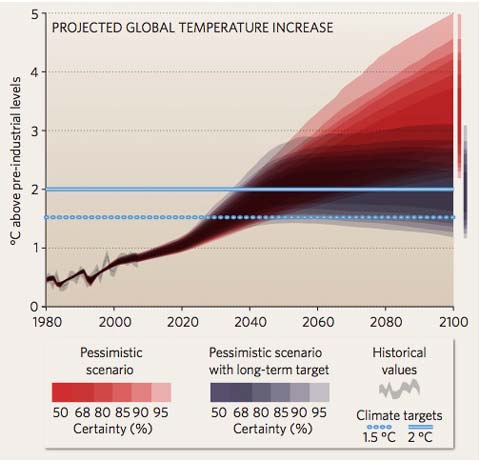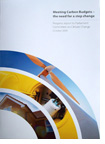 And so it begins: the rest of the world is starting to notice the major disconnect between New Zealand’s much advertised “clean and green” image and the National-led government’s piecemeal demolition of sensible climate policy. In yesterday’s Guardian, one of Britain’s leading quality newspapers, Fred Pearce devotes his “greenwash” column to New Zealand:
And so it begins: the rest of the world is starting to notice the major disconnect between New Zealand’s much advertised “clean and green” image and the National-led government’s piecemeal demolition of sensible climate policy. In yesterday’s Guardian, one of Britain’s leading quality newspapers, Fred Pearce devotes his “greenwash” column to New Zealand:
…my prize for the most shameless two fingers to the global community goes to New Zealand, a country that sells itself round the world as “clean and green. […] To rub our noses in it, last year New Zealand signed up to the UN’s Climate Neutral Network, a list of nations that are “laying out strategies to become carbon neutral”. But if you read the small print of what New Zealand has actually promised, it is a measly 50% in emissions by 2050 – something even the US can trump.
Pearce fails to draw the distinction between the policies of the last government — which were for carbon neutrality — and the stance of the current government — which has stopped all work on plans for carbon neutrality — but is spot on about the marketing problem NZ now faces:
Check the UNEP website and you will find an excruciating hagiography about a “climate neutral journey to Middle Earth”, in which everything from the local wines to air conditioning and Air New Zealand get the greenwash treatment.
After extolling the country’s green credentials, it asks: “Have you landed in a dreamland?” Well, UNEP’s reporter certainly has. He cheers New Zealand’s “global leadership in tackling climate change”, when the country’s minister in charge of climate negotiations, Tim Groser, has been busy reassuring his compatriots that “we would not try to be ‘leaders’ in climate change.”
This is not just political spin. It is also commercial greenwash. New Zealand trades on its greenness to promote its two big industries: tourism and dairy exports.
And there’s the crunch. Pearce goes on to point to research that suggests tourism would be badly hit by a loss of the clean green image. To make matters worse, environmental tourism is one of the fastest growing sectors of the market. Our agricultural exports also depend on that image — but Tim Groser and the audience of farmers he was addressing seem to have been blissfully unaware of the pit they were digging for themselves.
It takes years to build a good image and establish what marketing people call positive brand attributes, but it can take only a few newspaper articles to damage or destroy it. Tourism NZ’s British campaign just took a major blow. How long before the news spreads, tourist numbers fall and exports are hit? Will our Minister of Tourism rush to defend our brand? And just how are you going to do that, John? It’s your systematic demolition of sensible climate policies that is doing the damage.
[See also: Bernard Hickey this morning.]
[Hat tip: Sam Tobin]
Like this:
Like Loading...
 No doubt the New Zealand climate change minister will point out that the New Zealand’s emissions profile is different from that of the EU and that the exchanges about reduction targets that have been taking place in Europe in recent days therefore have little relevance for us. Nevertheless I have taken heart from reading about them in their own right, whether they have relevance to us or not, though I think they do have at least some.
No doubt the New Zealand climate change minister will point out that the New Zealand’s emissions profile is different from that of the EU and that the exchanges about reduction targets that have been taking place in Europe in recent days therefore have little relevance for us. Nevertheless I have taken heart from reading about them in their own right, whether they have relevance to us or not, though I think they do have at least some.

 And so it begins: the rest of the world is starting to notice the major disconnect between New Zealand’s much advertised “clean and green” image and the National-led government’s piecemeal demolition of sensible climate policy. In yesterday’s Guardian, one of Britain’s leading quality newspapers, Fred Pearce devotes his
And so it begins: the rest of the world is starting to notice the major disconnect between New Zealand’s much advertised “clean and green” image and the National-led government’s piecemeal demolition of sensible climate policy. In yesterday’s Guardian, one of Britain’s leading quality newspapers, Fred Pearce devotes his  The UK’s
The UK’s